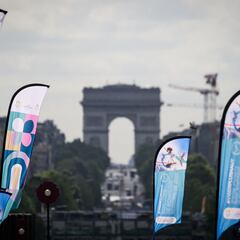Why are the Olympic Games held every four years?
In 1924, the first Olympic Winter Games were held in France. Between 1924 and 1992, the Summer and Winter Games were held in the same years.


The Olympic Games are held every fours to respect their ancient origins, which featured ‘Games’ that were held every four years at Olympia. The four-year interval between the Ancient Games editions was named an “Olympiad,” and this was used for dating purposes. Time was counted in Olympiads rather than years in that period.
The history of the Games goes back around 3,000 years, to the Peloponnese in Ancient Greece. Sports contests organised at Olympia were held every four years and eventually acquired the name ‘Olympic Games’.
It is unknown when exactly the Games started, but the date of 776 BC is often cited in written sources. The exact reasons for the birth of the Games are still unknown, as history has become mixed up with mythology. Professor David Potter argues that archaeological findings put the date closer to 650 BC.
The modern Olympic games are based on facts about the ancient #Olympics that are sometimes exaggerated or totally wrong.
— U-M College of LSA (@umichLSA) July 22, 2024
LSA Professor David Potter debunks 5 myths about the ancient Olympic games. ➡️ https://t.co/GfoplCvX6S pic.twitter.com/tNsLIdubt2
What is the origin of the Olympics?
The origin of the Olympics is shrouded in mystery and legend. One of the most popular myths identifies Heracles and his father Zeus as the progenitors of the Games. According to the stories, it was Heracles who first called the Games “Olympic” and established the custom of holding them every four years. The myth continues that after Heracles completed his twelve labours, he built the Olympic Stadium in honour of Zeus.
Oscar Swahn, age 72 during the Antwerp Games, remains the oldest athlete to compete in an Olympic event. #olympics pic.twitter.com/iLwJyS7fxe
— The Olympic Games (@Olympics) October 25, 2013
The Olympic Games were part of a cycle known as the Panhellenic Games, which included the Pythian Games, the Nemean Games, and the Isthmian Games. The Games reached the height of their success in the 6th and 5th centuries BC, but then gradually declined in importance as the Romans gained power and influence in Greece.
When was the International Olympic Committee formed?
The plan to recreate the Olympic Games was introduced in 1894, and the International Olympic Committee was formed. In 1896, the first modern Olympics were held in Athens. The revival of the Olympic Games in 1896, unlike the original Games, has a clear history. Pierre de Coubertin (1863–1937), a young Frenchman, felt that he could create an educational program in France that ran with the ancient Greek notion of a balance of mind and body. The Greeks themselves had tried to revive the Olympics by holding local athletic games in Athens during the 1800s, but without lasting success.
In 1924, the first Olympic Winter Games were held in France. Between 1924 and 1992, the Summer and Winter Games were held in the same years. In 1986, the IOC resolved to hold the Winter Games in four year intervals that were two years after the Summer Games.
Hiroshi Hoketsu was in his 70s when he competed at the 2012 Olympics! pic.twitter.com/ueGZGn4SdN
— FactBuffet (@FactBuffet) May 7, 2021
Related stories

France's long Olympic wait nearly over

Incredible medal hauls of the greatest Olympians
Thirteen countries competed at the Athens Games in 1896. Nine sports were on the agenda: cycling, fencing, gymnastics, lawn tennis, shooting, swimming, track and field, weight lifting, and wrestling. The 14-man US team dominated the track and field events, taking first place in nine of the 12 events.
The Games were a success, and a second Olympiad, to be held in France, was then scheduled. Olympic Games were held in 1900 and 1904, and by 1908 the number of competitors more than quadrupled the number at Athens, from 311 to 2,082. Jump forward to Paris 2024 and there are over 10,000 athletes from more than 200 different countries competing for the medals.
Complete your personal details to comment